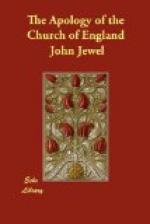All these notwithstanding were Popes, all Peter’s successors, all most holy fathers, whose several words we must take to be as good as several Gospels. If we be counted traitors which do honour our princes, which give them all obedience, as much as is due to them by God’s word, and which do pray for them, what kind of men then be these, which have not only done all the things before said, but also allow the same for specially well done? Do they then either this way instruct the people, as we do, to reverence their magistrate? Or can they with honesty appeach us as seditious persons, breakers of the common quiet, and despisers of princes’ majesty?
Truly, we neither put off the yoke of obedience from us; neither do we disorder realms; neither do we set up or pull down kings; nor translate governments; nor give our kings poison to drink; nor yet hold to them our feet to be kissed; nor, opprobriously triumphing over them, leap into their necks with our feet. This rather is our profession; this is our doctrine: that every soul, of what calling soever he be—be he monk, be he preacher, be he prophet, be he Apostle—ought to be subject to kings and magistrates; yea, and that the Bishop of Rome himself—unless he will seem greater than Evangelists, than the Prophets, or the Apostles—ought both to acknowledge and to call the emperor his lord and master, which the old Bishops of Rome, who lived in times of more grace, ever did. Our common teaching also is, that we ought so to obey princes as men sent of God; and that whoso withstandeth them, withstandeth God’s ordinance. This is our showing, and this is well to be seen, both in our books and in our preachings, and also in the manners and modest behaviour of our people.




